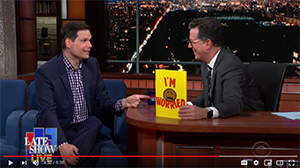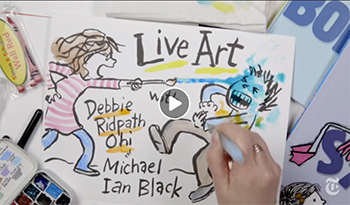Thursday
Apr122007
How does a good concom work with a Guest?
Posted on  Thursday, April 12, 2007 at 2:36PM
Thursday, April 12, 2007 at 2:36PM
 Thursday, April 12, 2007 at 2:36PM
Thursday, April 12, 2007 at 2:36PM
From Bill Sutton (GAFilk):
"Communicate with your guest early and often.
Don't assume your guest knows the drill. He/she may never have been a guest before, in fact may never have travelled on someone else's dime before. Be prepared to walk through every part of the process, from arranging transportation through checking in when the billing is to the convention.
Be specific and explicit when offering the guestship as to: what the con is paying for, what the con is NOT paying for, what activities are expected from the guest, what activities are NOT expected, requested arrival and departure dates. Specify treatment of "guests of the guest" such as partner, children, groupies, etc. in terms of memberships, banquet tickets, room arrangements, and such like.
If the guest is arriving by public transportation, provide someone from the concom to pick up at the particular terminal/airport/station. The only exception should be when the guest is spending time before or after the convention on his/her own - in this case, it is OK to leave transport to or from the hotel up to the guest, but be sure everyone understands the plan.
Don't monopolize your guest! You brought the guest in to be available to attendees of the convention, not as private entertainment for the concom. The reason I like to ask guests to arrive Thursday and leave Monday is so the concom can spend some time with them before and after the convention.
Don't Overprogram! A guest who is doing a concert should have at least an hour and a half (preferably more) of completely free time (time when it is understood he/she will be totally unavailable) prior to the concert. A good rule of thumb is no more than 2 hours of focal point programming (panel/concert where heavy contribution is expected) and no more than an additional 2 hours of "being there" programming (banquet, "meet the guests" session, etc.) per 12-hour convention day. Pro-rate for Friday and Sunday, of course, and remember that autograph sessions can be exhausting for some guests.
Don't expect that your guest will automatically become a regular attendee of the convention in future years. Sometimes this happens, but frequently guests simply get invited too many places to add them all to their list. After all, you probably brought this guest in because your convention isn't a normal stop for him/her."
Comments? Suggestions? Please post below.
"Communicate with your guest early and often.
Don't assume your guest knows the drill. He/she may never have been a guest before, in fact may never have travelled on someone else's dime before. Be prepared to walk through every part of the process, from arranging transportation through checking in when the billing is to the convention.
Be specific and explicit when offering the guestship as to: what the con is paying for, what the con is NOT paying for, what activities are expected from the guest, what activities are NOT expected, requested arrival and departure dates. Specify treatment of "guests of the guest" such as partner, children, groupies, etc. in terms of memberships, banquet tickets, room arrangements, and such like.
If the guest is arriving by public transportation, provide someone from the concom to pick up at the particular terminal/airport/station. The only exception should be when the guest is spending time before or after the convention on his/her own - in this case, it is OK to leave transport to or from the hotel up to the guest, but be sure everyone understands the plan.
Don't monopolize your guest! You brought the guest in to be available to attendees of the convention, not as private entertainment for the concom. The reason I like to ask guests to arrive Thursday and leave Monday is so the concom can spend some time with them before and after the convention.
Don't Overprogram! A guest who is doing a concert should have at least an hour and a half (preferably more) of completely free time (time when it is understood he/she will be totally unavailable) prior to the concert. A good rule of thumb is no more than 2 hours of focal point programming (panel/concert where heavy contribution is expected) and no more than an additional 2 hours of "being there" programming (banquet, "meet the guests" session, etc.) per 12-hour convention day. Pro-rate for Friday and Sunday, of course, and remember that autograph sessions can be exhausting for some guests.
Don't expect that your guest will automatically become a regular attendee of the convention in future years. Sometimes this happens, but frequently guests simply get invited too many places to add them all to their list. After all, you probably brought this guest in because your convention isn't a normal stop for him/her."
Comments? Suggestions? Please post below.
in  Conventions
Conventions
 Conventions
Conventions 







